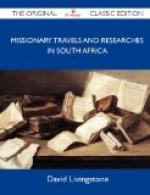There is also a sort of fraternity of freemasons, named Empacasseiros, into which no one is admitted unless he is an expert hunter, and can shoot well with the gun. They are distinguished by a fillet of buffalo hide around their heads, and are employed as messengers in all cases requiring express. They are very trustworthy, and, when on active service, form the best native troops the Portuguese possess. The militia are of no value as soldiers, but cost the country nothing, being supported by their wives. Their duties are chiefly to guard the residences of commandants, and to act as police.
The chief recreations of the natives of Angola are marriages and funerals. When a young woman is about to be married, she is placed in a hut alone and anointed with various unguents, and many incantations are employed in order to secure good fortune and fruitfulness. Here, as almost every where in the south, the height of good fortune is to bear sons. They often leave a husband altogether if they have daughters only. In their dances, when any one may wish to deride another, in the accompanying song a line is introduced, “So and so has no children, and never will get any.” She feels the insult so keenly that it is not uncommon for her to rush away and commit suicide. After some days the bride elect is taken to another hut, and adorned with all the richest clothing and ornaments that the relatives can either lend or borrow. She is then placed in a public situation, saluted as a lady, and presents made by all her acquaintances are placed around her. After this she is taken to the residence of her husband, where she has a hut for herself, and becomes one of several wives, for polygamy is general. Dancing, feasting, and drinking on such occasions are prolonged for several days. In case of separation, the woman returns to her father’s family, and the husband receives back what he gave for her. In nearly all cases a man gives a price for the wife, and in cases of mulattoes, as much as 60 Pounds is often given to the parents of the bride. This is one of the evils the bishop was trying to remedy.
In cases of death the body is kept several days, and there is a grand concourse of both sexes, with beating of drums, dances, and debauchery, kept up with feasting, etc., according to the means of the relatives. The great ambition of many of the blacks of Angola is to give their friends an expensive funeral. Often, when one is asked to sell a pig, he replies, “I am keeping it in case of the death of any of my friends.” A pig is usually slaughtered and eaten on the last day of the ceremonies, and its head thrown into the nearest stream or river. A native will sometimes appear intoxicated on these occasions, and, if blamed for his intemperance, will reply, “Why! my mother is dead!” as if he thought it a sufficient justification. The expenses of funerals are so heavy that often years elapse before they can defray them.




